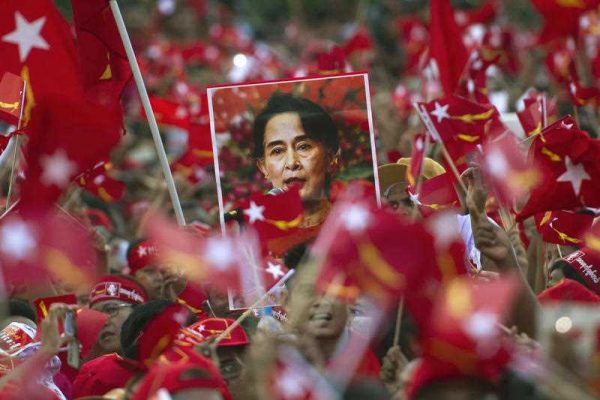With such a landslide victory, there have been concerns about whether the military (which has a historical penchant for intervening to ensure their rule) would accept the results. But the leadership of the ruling Union and Solidarity Development Party (USDP), President Thein Sein, and the Commander in Chief of the Tatmadaw (Myanmar’s military) Senior General Min Aung Hlaing have all congratulated NLD leader Aung San Suu Kyi on her victory. They publicly offered their support to enact a smooth transition of power. The former junta leader Than Shwe has also apparently offered support to the new government.
Yet these conciliatory gestures are based on the political realities of the current system. The NLD, despite their definitive electoral victory, does not have a free hand to govern.
The Tatmadaw remains the most powerful actor in Myanmar. While the political system is not directly under their control, entrenched powers require the approval of the Tatmadaw for macro-level changes to the state and its political organisation. This configuration has allowed the military to secure a number of core interests regardless of other changes to the state and society. The insulation of such interests partly explains their willingness to accept the demise of their political brethren in the USDP.
Rather than assume the domestic and international risks of annulling the elections (or overthrowing the system entirely), the military has allowed those outside its influence access to power, knowing full well it must be included in any future government. The military remains institutionally independent from the political apparatus, controls the security services and bureaucracy, and can use its 25 per cent allocation of parliamentary seats to dictate the pace and scale of any constitutional change.
Aung San Suu Kyi is keenly aware of the need to work with the Tatmadaw. She must balance their core interests (at least initially) while slowly moving the system beyond their influence. She has pledged to hold ‘no past grudges’, an important sign that she will not pursue political or legal avenues to hold the generals accountable for past actions. This would be the one area that could unite the military and former regime members to take action to bring down her administration. And Min Aung Hlaing has cautioned against quick reforms, indicating that the military will only recede from politics if it assesses the state to be stable, specifically regarding the country’s ongoing ethnic conflicts.
Convincing the remaining ethnic armed groups to sign the National Ceasefire Accord is a top priority and campaign pledge of the NLD. This is part of a larger strategy to ensure internal peace by meaningfully including ethnic groups in the polity. Aung San Suu Kyi’s determination to personally lead the ceasefire dialogues has largely been welcomed by many of Myanmar’s main ethnic parties. But the issue of ethnic reconciliation will strain Aung San Suu Kyi’s ability to balance the competing interests between ethnic groups and the Tatmadaw.
The Tatmadaw operates at arm’s length from the government, sometimes running in contradiction to it. This may present challenges for the new President and NLD-dominated legislature as they will need to ensure military operations are in accordance with their larger governance agenda. Armed conflict against ethnic groups has been a primary motivation and justification for the military’s involvement in politics.
For ethnic groups, addressing these matters is necessary if longstanding peace is to be built and maintained. The NLD will also have to investigate the establishment of a federal union; maintain the autonomy of ethnic armies; and adjudicate wide-spread instances of land seizures, forced relocations and human rights abuses by the military.
The NLD wants to effectively manage the transition of power from the USDP, continue the functioning of government in concert with military and ethnic groups, and start addressing systemic issues that have plagued Myanmar for decades. But in order to do so, it must build a strategy defined by discrete objectives that can be achieved and agreed upon by the major stakeholders. The NLD will not be able to resolve all the interwoven and highly complex issues surrounding ethnic conflict in one fell swoop. At best, it would become bogged down in political disagreement and paralysis; at worst, it would entice the military or armed ethnic groups to renege on their commitments.
The NLD must develop a gradual and segmented approach to find areas of common agreement, even if they are small and sparse. It should deal with immediate matters in order to build the necessary momentum and cooperation before tackling the larger issues. For example, constitutional change will be a major challenge, as there are deep institutional interests involved, particularly those of the military.
The new parliament must slowly build a solid foundation of policy change. The task must aim to fundamentally alter the tone and style of the working relationship between it, the Tatmadaw and Myanmar’s ethnic groups. This is crucial if there is to be any hope of enacting the far-reaching changes to the state and society that many voted for.
Adam P MacDonald is an independent researcher based in Halifax, Canada.


At the risk of sounding ‘paranoid,’ is it possible that the military would quietly fuel ethnic conflicts as a way to undermine the NLD’s agenda and legitimacy? If they do this, can they then use the NLD’s ‘weaknesses’ as reasons not to support a transition to civilian rule? Or to trigger a coup in a year or two after it becomes apparent that the NLD is failing to unify the country?
Suu Kyi is facing HUGE challenges indeed!